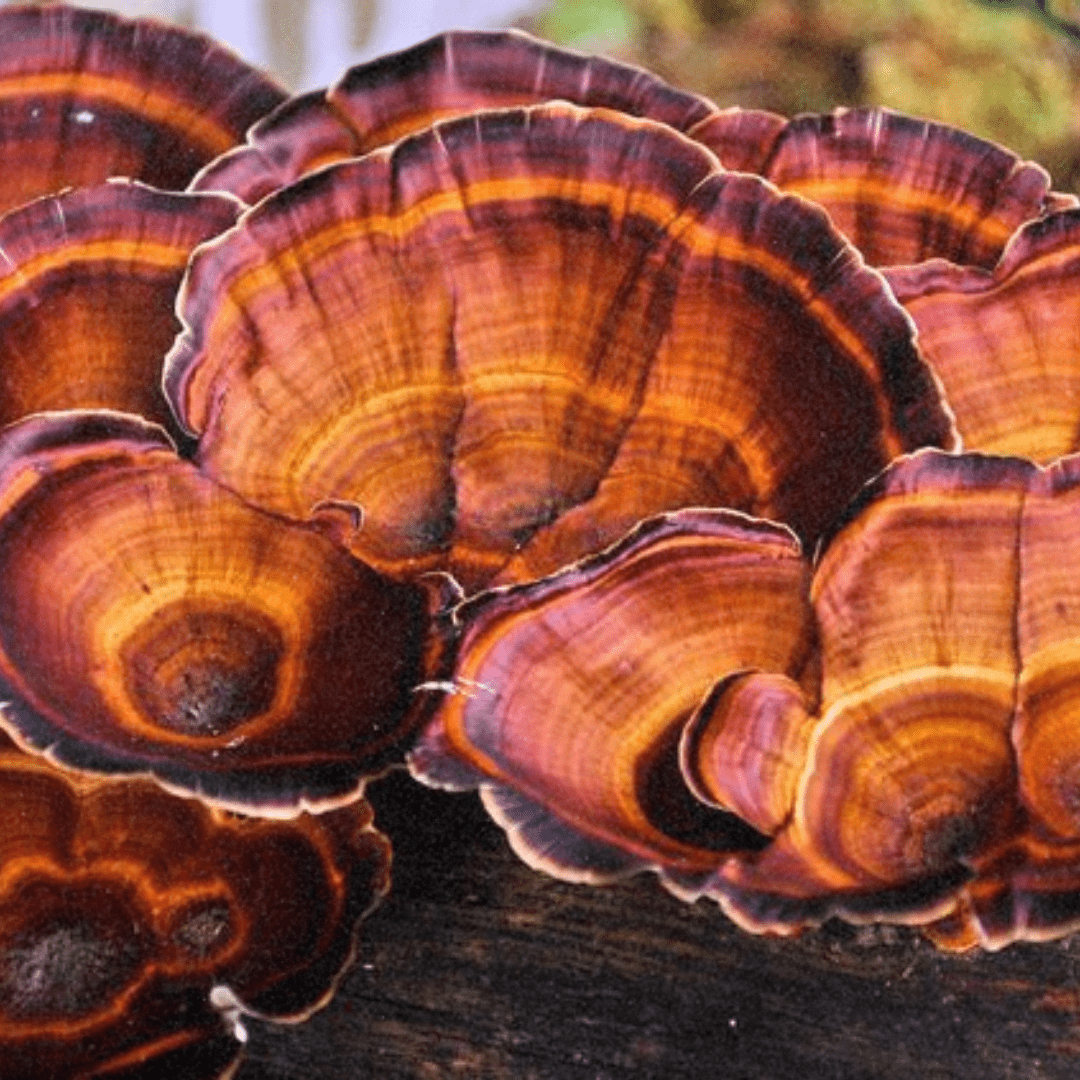
The Reishi mushroom, or Ganoderma lucidum, is a fungus deeply embedded in the history of traditional Asian medicine. Scientific investigations and clinical trials have been delving into its myriad potential health benefits and applications. In Asia, Reishi mushrooms have long been integral to traditional medicine. Their use has recently expanded, encompassing treatments for pulmonary diseases and even cancer.
In Japan and China, Reishi and similar medicinal mushrooms are esteemed for their complementary role in standard cancer therapies, demonstrating a significant and safe clinical history. Their enduring use and recent integration into modern medical practices underscore their lasting importance in health and wellness.
Discover the extensive array of potential health benefits that Reishi mushroom offers!
A Brief History
In the rich tapestry of Chinese culture, the Reishi mushroom, or "the mushroom of immortality," stood as a beacon of longevity and health. This enchanting title, steeped in ancient lore, signified its revered status, especially among the royalty and nobility. Known as "the mushroom of kings," its rarity, sourced exclusively from wild forests, made it a symbol of luxury and prestige.
Their woody texture and distinctively bitter flavour belied their true value, which lay not in their taste but in their purported health benefits. These benefits have been celebrated for centuries, with the Reishi mushroom playing a pivotal role in traditional wellness practices.
Today, this enduring belief in Reishi's medicinal properties spans across continents, merging age-old Eastern traditions with contemporary Western health insights. Its legacy, transcending mere folklore, continues to intrigue and inspire health enthusiasts, symbolising a harmonious blend of past wisdom and present-day health consciousness. [1]
Stress Relief Through Neuroprotection and Antidepressant Effects
Reishi mushrooms are increasingly recognised for their neuroprotective and antidepressant properties, offering a natural approach to stress relief. More research is required to fully substantiate these effects, yet the initial findings are promising, particularly regarding mental health benefits [2].
In one study, breast cancer survivors suffering from fatigue reported a significant reduction in their symptoms and an improvement in quality of life after incorporating Reishi mushrooms into their diet [3]. Further research also suggests Reishi's beneficial effects on depression and anxiety. For those interested in exploring these benefits, our "De-Stress me" collection, infused with Reishi, could be a supportive addition to your wellness routine.

Immune System Support
One of the notable benefits of Reishi mushrooms is their potential to strengthen the immune system. They have shown effects on the immune system including prevention of formation or growth of abnormal blood vessel. [4] [5]
Many studies show that Reishi can affect the genes in WBCs. These genes are critical for immune response. Additionally, research suggests that some of these mushrooms may alter inflammation pathways. A study suggests that Reishi mushrooms can increase the activity of white blood cells (WBC) called natural killer cells. These WCs are responsible for fighting infections and cancer in the body. [6]
Cardioprotective and Antidiabetic Effects
Reishi mushrooms have also been explored for their cardioprotective and antidiabetic properties. Clinical research indicates that these mushrooms may help bring relief in case of cardiovascular problems. [7]
This aspect is particularly significant for type 2 diabetes. Furthermore, improvements in dyslipidemia—a condition characterised by abnormal amounts of lipids in the blood—have been observed using Reishi mushrooms in rats. This could imply benefits for cholesterol management and overall cardiovascular health for humans as well. But further research is needed to explore its effects on human beings. [8]
Although studies show that Reishi mushrooms may aid in regulating blood sugar levels and enhancing insulin sensitivity, there is no scientific proof to support the notion that these mushrooms can cure diabetes. It's important to understand that while they can be beneficial for diabetes management, they should not be relied upon as a sole treatment for the condition. [9]
However, it is important to note that while these effects are promising, Reishi mushrooms are not universally supported as a means to reduce cardiovascular risks specifically associated with type 2 diabetes. Their role should be considered part of a broader lifestyle and medical approach rather than a standalone solution. As always, individuals interested in using Reishi mushrooms for these purposes should consult healthcare professionals for advice tailored to their specific health needs.

Anti-inflammatory and Anti-tumor Benefits of Reishi
The Reishi mushroom is increasingly acknowledged for its role in cancer care, with growing evidence supporting its potential to combat cancer cells. Studies have indicated that Reishi may be effective in triggering the death of these cells. Notably, a comprehensive study featured in "The Cochrane Library," highlighted that extracts from Reishi mushrooms could impede the proliferation and spread of cancer cells [10].
While promising as a supplementary aid in cancer treatment, it is essential to remember that Reishi mushrooms are not replacements for conventional cancer therapies. Their anti-inflammatory and anti-tumor effects are primarily attributed to their unique components, including beta-glucan polysaccharides and triterpenes, contributing to their potential in holistic health management.
Renoprotective and Hepatoprotective Effects
Reishi may also protect the kidneys and liver from damage, as they are not only known for their traditional uses but also for their potential renoprotective and hepatoprotective effects. It means they may offer protective benefits to the kidneys and the liver.
Bioactive compounds in Reishi mushrooms can help shield these vital organs from damage caused by toxins, oxidative stress, and inflammation. These protective properties are particularly beneficial in combating diseases related to the liver and kidneys, where they may help slow disease progression and enhance organ function. [11]
Additionally, the anti-inflammatory and antioxidant properties of Reishi mushrooms contribute to the recovery of acute liver injury. It makes them a valuable addition to a holistic approach to health. [12]
Reishi's Role in Contemporary Wellness
In today's wellness landscape, Reishi mushrooms are a staple, thanks to their impressive range of health benefits. These ancient wonders are now modern superfoods, found in supplements that boost immunity, fight inflammation, and reduce stress. Lucid has embraced this trend, innovatively incorporating Reishi into our "De-Stress Me” collection. Our bars blend the timeless benefits of Reishi with a modern, on-the-go lifestyle, offering a delicious, nutritious snack to support your daily wellness journey with the unique flair.

Reflecting on Reish: In Conclusion
As we draw to a close, Reishi mushrooms stand as a beacon of wellness and longevity. Central to the philosophy of Lucid, these traditional medicinal mushrooms offer a diverse range of surprising health benefits, from enhancing the immune system to exhibiting anti-inflammatory and anti-tumor properties, and showing potential in neuroprotection and mental health support. It's essential, however, to balance our enthusiasm with an understanding of Reishi's historical significance and the ongoing need for comprehensive research to fully comprehend its therapeutic capabilities. As research continues to evolve, we at Lucid remain committed to integrating these ancient secrets into our modern wellness practices, eagerly awaiting the new insights that future studies will bring to light.
References
- Grass & Co. (n.d.). Reishi mushroom benefits. Retrieved from https://grassandco.com/blogs/mushrooms/reishi-mushroom-benefits
- Li, S. P., & Zhang, Z. (2021). Ganoderma lucidum polysaccharides as an anti-cancer agent. Anticancer Agents in Medicinal Chemistry, 21(3), 350–359. https://doi.org/10.2174/1871520620666200316112232
- Upton, R. (2021). The pharmacological potential of mushrooms. Evidence-Based Complementary and Alternative Medicine, 2021. https://doi.org/10.1155/2021/8418607
- Healthline. (n.d.). 6 Benefits of Reishi Mushroom (Plus Side Effects). Retrieved from https://www.healthline.com/nutrition/reishi-mushroom-benefits#TOC_TITLE_HDR_3
- Rejuvii. (2018, April 29). 13 Health Benefits of Reishi Mushrooms. Retrieved from https://www.rejuvii.com/post/2018/04/29/13-health-benefits-of-reishi-mushrooms
- WebMD. (n.d.). Reishi Mushroom: Uses and Risks. Retrieved from https://www.webmd.com/vitamins-and-supplements/reishi-mushroom-uses-and-risks
- Liu, Y., Zhang, J., Tang, Q., Yang, Y., Guo, Q., Wang, Q., ... & Zhou, Q. (2020). ReishiMax extends the lifespan of mice: A preliminary report. Experimental and Therapeutic Medicine, 19(3), 2166–2172. https://doi.org/10.3892/etm.2020.8444
- Nature's Rise. (n.d.). Reishi Mushroom for Diabetes. Retrieved from https://www.naturesrise.com/blogs/brainfood/reishi-mushroom-for-diabetes#
- Chen, X., Hu, Z. P., Yang, X. X., Huang, M., Gao, Y., Tang, W., ... & Zhou, S. F. (2006). Monitoring of immune responses to a herbal immuno-modulator in patients with advanced colorectal cancer. International Immunopharmacology, 6(3), 499-508. https://doi.org/10.1016/j.intimp.2005.08.026
- Kao, C. H., Bishop, K. S., Xu, Y., Han, D. Y., Murray, P. M., & Marlow, G. J. (2019). The potential of Reishi mushrooms for cancer prevention and treatment. Progress in Molecular Biology and Translational Science, 163, 223-243. https://doi.org/10.1016/bs.pmbts.2019.02.008
- Memorial Sloan Kettering Cancer Center. (n.d.). Reishi Mushroom. Retrieved from https://www.mskcc.org/cancer-care/integrative-medicine/herbs/reishi-mushroom
- Zhang, W., Tao, J., Yang, X., Yang, Z., Zhang, L., Liu, H., ... & Zhou, Q. (2019). The role of Reishi mushrooms in health and disease: A systematic review. Journal of Ethnopharmacology, 246, 112243. https://doi.org/10.1016/j.jep.2019.112243




The Ultimate Stress Buster: How Ashwagandha Can Help You Relax
Maca Magic Revealed: How This Super Root is Changing Lives!